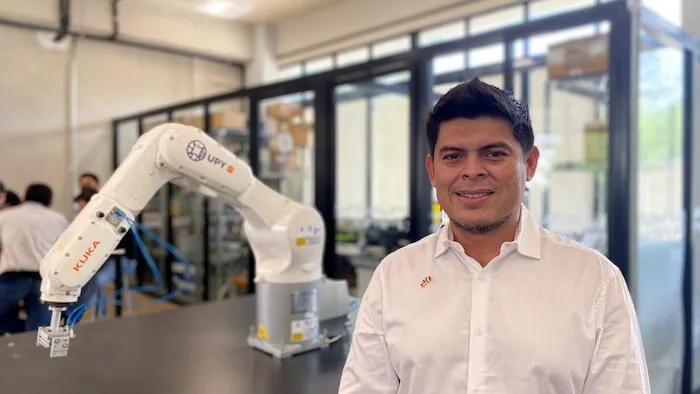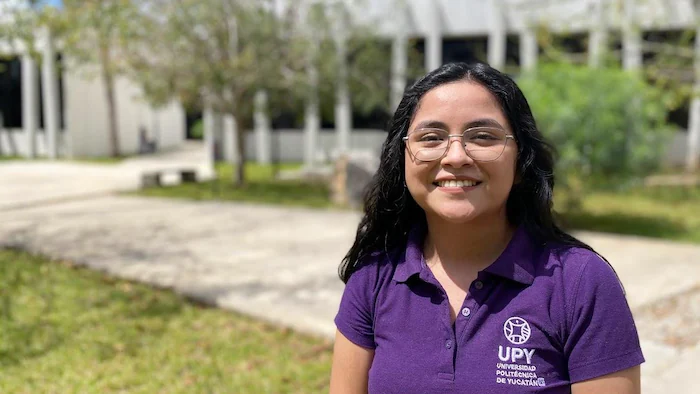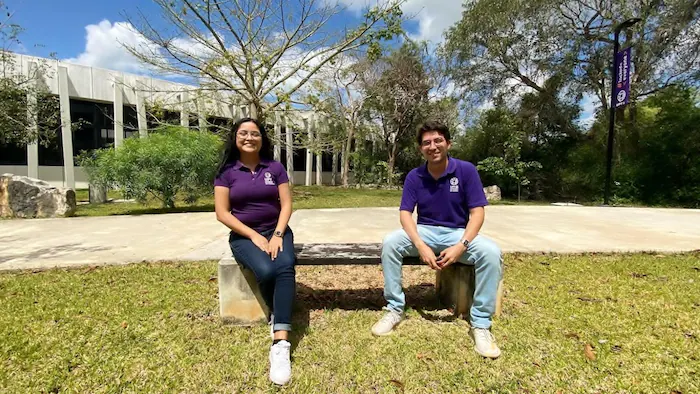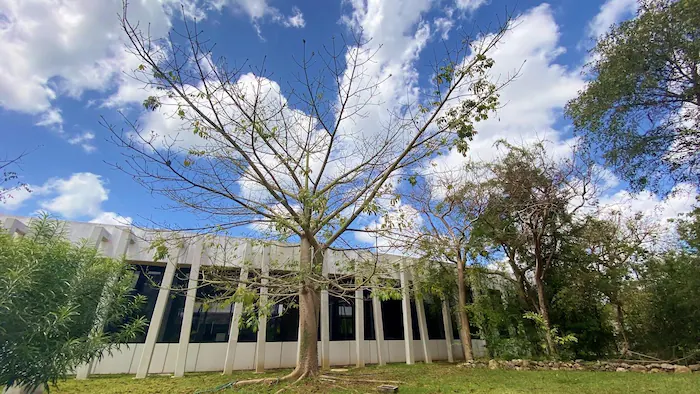I managed to spend four months [au Canada] And obviously everything I learned there, I brought it here and tried to harness and share it to be like light that spreads. And more personally, so that when I finish my studies, I can start a scoop.

Ronaldo Jesús Alonso of UPY studied at Algonquin College in Ottawa, the capital of Canada.
Photo: RCI / Paloma Martinez Mendes
Since its founding in 2017, UPY has been associated with and delegated students to seven Canadian universities. So far, 30 Yucatecan students have studied in Canada thanks to this agreement between universities.
Exchanges for over 25 years
Since Canada, Mexico, and the United States signed the North American Free Trade Agreement in 1994, there has been an academic exchange program overseen by the North American Higher Education Cooperation Consortium.
This exchange program allows students to benefit from lower tuition fees compared to other international students, and also avoids having to enter into bilateral agreements with each of the ninety participating institutions.
The program also does not require a bilateral exchange between institutions, but can be administered in such a way that the student can attend an institution in another country and validate his studies at his or her home institution.

For Victor Camara, these exchanges are an integral part of the Fourth Industrial Revolution in which the University is actively involved, and the other three revolutions are those driven by the steam engine, electricity and the automation of production processes.
Photo: RCI / Paloma Martinez Mendes
Victor Camara asserts that in the context of the Fourth Industrial Revolution, cybernetics – artificial intelligence, big data and the Internet of Things – are essential, but the globalization of knowledge and practices are just as important.
This was the last point that motivated his university to embark on a mobility program with Canada.
UPY operates under the BIS model, which is bilingual, international and sustainable. Offering courses in English and internationalizing students and knowledge is part of its DNA. The association with Canada was born when the Directorate General of Technological Universities and Polytechnic Universities, to which we belong, launched a mobility program exclusively for universities with the BIS model.
Fátima Martínez Torres is also one of the Yucatán Polytechnic University students who was awarded a scholarship under the study in Canada program.
For this data engineering graduate student, who is studying at Lakeview University in Thunderby, Ontario has given her the opportunity to broaden her horizons both personally and professionally.
I did it so as not to stick with what is in Mexico. Since Canada is very diverse and the universities welcome international students, I believe I not only participated in a Canadian program but also benefited from the perspectives of other countries.

Fatima Martinez-Torres says she understands that although her stay in Canada was short, it involved significant expenses. However, she thinks it was worth it.
Photo: RCI / Paloma Martinez Mendes
Victor Camara also believes that the experience for UPY students in Canada is worthwhile, even if it is expensive. Although tuition fees are covered under inter-university agreements, students receive grants to cover their food and housing expenses.
However, according to the head of exchange programs at this Yucatan University, it would be the ideal To be able to offer opportunities to more young people from our university
.
Victor Camara acknowledges that until now, most of the activities related to Canadian universities have been to send students from Mexico to Canada. However, says Camara, UPY wants to move on. If we are hosting here a Canadian professor or group of students […] The effect will be much greater.
The representative of the university explains that the quality of life, climate and a very active Canadian community in the region, especially between November and April, would enhance the attractiveness of Yucatan to Canadian students and professors.
Ening Chau, Associate Dean for Global Education and Partnerships at St. Lawrence College.
Photo: RCI
In an interview with Radio Canada International (RCI), Dean of St. Lawrence College [une des universités partenaires de l’UPY]Ining Chao emphasized that student exchange is the first step in the relationship with the Mexican university and that new forms of cooperation are being studied.
Since many of our courses are still online, we wondered why not connect them with UPY students. So we gave it a try by offering three sessions with our business analytics tutor. It is a very practical topic and I heard the students really liked it.
In terms of future direction, this post-secondary institution wants to explore more of these types of ideas with UPY since thanks to the pandemic, everyone is More comfortable with technology for teaching and learning
.
Zhao explained that they are considering visiting professors in Yucatan, exchanging research, and supervising student projects, among other things.
The dean of St. Lawrence College says anything is possible, which says the goal is to expand and improve cooperation because for her institution the globalization of knowledge, as at the University of Yucatan, is essential to the future of young people.
We want to promote global citizenship for all students, including those who grew up in Canada. The fact that they can interact with students from Mexico and 46 other countries around the world really enriches their experience.

Ronaldo Jesús Alonso and Fatma Martinez Torres, from the Polytechnic University of Yucatan (UPY), studied for one session in a row at Algonquin College and Lakeview University in Canada.
Photo: RCI / Paloma Martinez Mendes
For Ronaldo, studying in Canada was a personal achievement. However, it was the communication with the other students and teachers that made her trip to Canada so memorable.
The former UPY president once told me that we must be world-class engineers. A perspective to think globally, act locally. This is what I wanted to bring from Canada.
Fatima intends to return to live in Canada for a few years. Even the cold does not discourage her. However, Canada also gave him something else: the desire to travel and see more of the world.
More than anything I would like to go back there to continue living that experience, reclaiming the chill, and seeing the landscapes we don’t see here. […] Being in Canada and meeting such diverse people has shown me that there is a lot to know or explore.

The land of UPY covers 20 hectares and buildings occupy 25% of this area. There are no boundaries limiting the territory to allow the native fauna to spread and the native flora has been preserved. The ceiba planted pictured during the opening of the university in 2017. A Mayan elder conducted the planting and thanksgiving ceremonies. According to Victor Camara, the siba is a symbolic symbol because it grows together with the university and society.
Photo: RCI / Paloma Martinez Mendes
The Mexican state of Yucatan is known to have a Mayan or Mayan population of nearly one million people.
With this in mind, according to Victor Camara, we should consider developing a relationship between Canadian First Nations and Yucatec Maya. In his opinion, this will allow a better understanding of the contemporary reality of the Maya.
Today Maya is engaged in politics, is an entrepreneur, studies at the university, lives in a residential area and speaks English.
A university exchange program with this Indigenous component can build enriching bridges between the two countries. Victor Camara concludes that projects of this type are being negotiated between the Polytechnic University of Yucatan and its Canadian counterparts.
Note: This report is also available in Spanish
This report is part of a series focusing on Canadian-Mexico exchanges at various levels, including education, the arts, and the economy, among others.

“Subtly charming problem solver. Extreme tv enthusiast. Web scholar. Evil beer expert. Music nerd. Food junkie.”

![[Reportage] Yucatan students in Canadian universities, a winning formula [Reportage] Yucatan students in Canadian universities, a winning formula](https://www.vaughantoday.ca/wp-content/uploads/2022/04/1649098338_Reportage-Yucatan-students-in-Canadian-universities-a-winning-formula.jpg)
